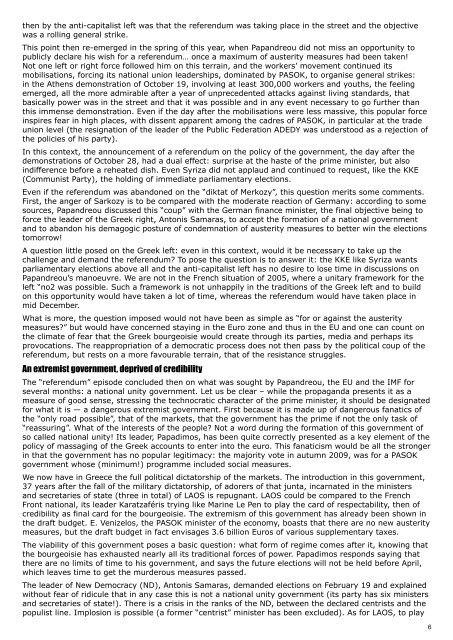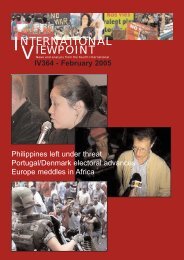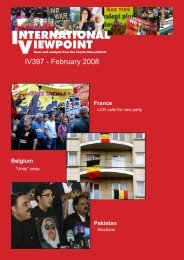download - International Viewpoint
download - International Viewpoint
download - International Viewpoint
Create successful ePaper yourself
Turn your PDF publications into a flip-book with our unique Google optimized e-Paper software.
then by the anti-capitalist left was that the referendum was taking place in the street and the objective<br />
was a rolling general strike.<br />
This point then re-emerged in the spring of this year, when Papandreou did not miss an opportunity to<br />
publicly declare his wish for a referendum… once a maximum of austerity measures had been taken!<br />
Not one left or right force followed him on this terrain, and the workers’ movement continued its<br />
mobilisations, forcing its national union leaderships, dominated by PASOK, to organise general strikes:<br />
in the Athens demonstration of October 19, involving at least 300,000 workers and youths, the feeling<br />
emerged, all the more admirable after a year of unprecedented attacks against living standards, that<br />
basically power was in the street and that it was possible and in any event necessary to go further than<br />
this immense demonstration. Even if the day after the mobilisations were less massive, this popular force<br />
inspires fear in high places, with dissent apparent among the cadres of PASOK, in particular at the trade<br />
union level (the resignation of the leader of the Public Federation ADEDY was understood as a rejection of<br />
the policies of his party).<br />
In this context, the announcement of a referendum on the policy of the government, the day after the<br />
demonstrations of October 28, had a dual effect: surprise at the haste of the prime minister, but also<br />
indifference before a reheated dish. Even Syriza did not applaud and continued to request, like the KKE<br />
(Communist Party), the holding of immediate parliamentary elections.<br />
Even if the referendum was abandoned on the “diktat of Merkozy”, this question merits some comments.<br />
First, the anger of Sarkozy is to be compared with the moderate reaction of Germany: according to some<br />
sources, Papandreou discussed this “coup” with the German finance minister, the final objective being to<br />
force the leader of the Greek right, Antonis Samaras, to accept the formation of a national government<br />
and to abandon his demagogic posture of condemnation of austerity measures to better win the elections<br />
tomorrow!<br />
A question little posed on the Greek left: even in this context, would it be necessary to take up the<br />
challenge and demand the referendum? To pose the question is to answer it: the KKE like Syriza wants<br />
parliamentary elections above all and the anti-capitalist left has no desire to lose time in discussions on<br />
Papandreou’s manoeuvre. We are not in the French situation of 2005, where a unitary framework for the<br />
left “no2 was possible. Such a framework is not unhappily in the traditions of the Greek left and to build<br />
on this opportunity would have taken a lot of time, whereas the referendum would have taken place in<br />
mid December.<br />
What is more, the question imposed would not have been as simple as “for or against the austerity<br />
measures?” but would have concerned staying in the Euro zone and thus in the EU and one can count on<br />
the climate of fear that the Greek bourgeoisie would create through its parties, media and perhaps its<br />
provocations. The reappropriation of a democratic process does not then pass by the political coup of the<br />
referendum, but rests on a more favourable terrain, that of the resistance struggles.<br />
An extremist government, deprived of credibility<br />
The “referendum” episode concluded then on what was sought by Papandreou, the EU and the IMF for<br />
several months: a national unity government. Let us be clear – while the propaganda presents it as a<br />
measure of good sense, stressing the technocratic character of the prime minister, it should be designated<br />
for what it is — a dangerous extremist government. First because it is made up of dangerous fanatics of<br />
the “only road possible”, that of the markets, that the government has the prime if not the only task of<br />
“reassuring”. What of the interests of the people? Not a word during the formation of this government of<br />
so called national unity! Its leader, Papadimos, has been quite correctly presented as a key element of the<br />
policy of massaging of the Greek accounts to enter into the euro. This fanaticism would be all the stronger<br />
in that the government has no popular legitimacy: the majority vote in autumn 2009, was for a PASOK<br />
government whose (minimum!) programme included social measures.<br />
We now have in Greece the full political dictatorship of the markets. The introduction in this government,<br />
37 years after the fall of the military dictatorship, of adorers of that junta, incarnated in the ministers<br />
and secretaries of state (three in total) of LAOS is repugnant. LAOS could be compared to the French<br />
Front national, its leader Karatzaféris trying like Marine Le Pen to play the card of respectability, then of<br />
credibility as final card for the bourgeoisie. The extremism of this government has already been shown in<br />
the draft budget. E. Venizelos, the PASOK minister of the economy, boasts that there are no new austerity<br />
measures, but the draft budget in fact envisages 3.6 billion Euros of various supplementary taxes.<br />
The viability of this government poses a basic question: what form of regime comes after it, knowing that<br />
the bourgeoisie has exhausted nearly all its traditional forces of power. Papadimos responds saying that<br />
there are no limits of time to his government, and says the future elections will not be held before April,<br />
which leaves time to get the murderous measures passed.<br />
The leader of New Democracy (ND), Antonis Samaras, demanded elections on February 19 and explained<br />
without fear of ridicule that in any case this is not a national unity government (its party has six ministers<br />
and secretaries of state!). There is a crisis in the ranks of the ND, between the declared centrists and the<br />
populist line. Implosion is possible (a former “centrist” minister has been excluded). As for LAOS, to play<br />
6









